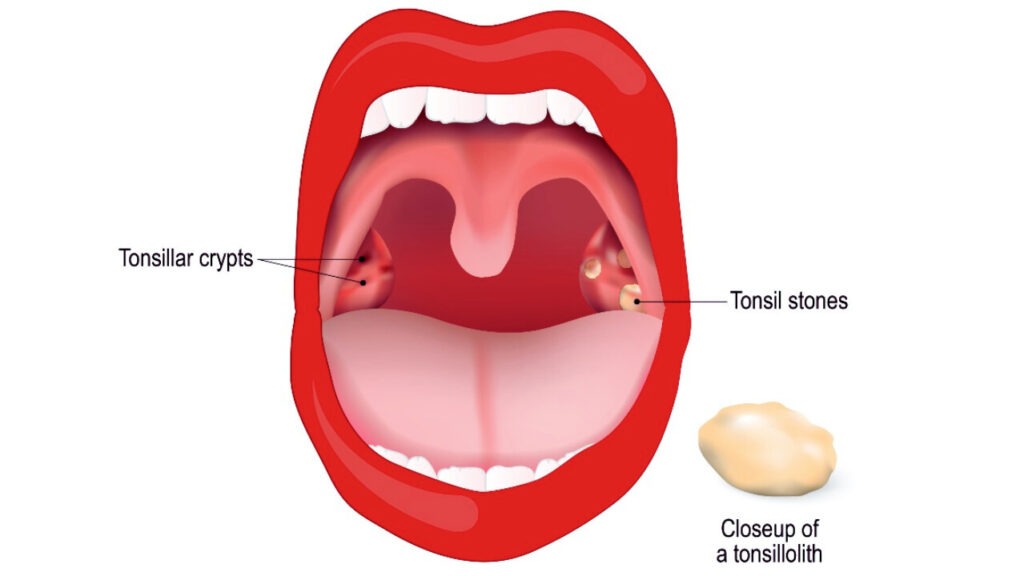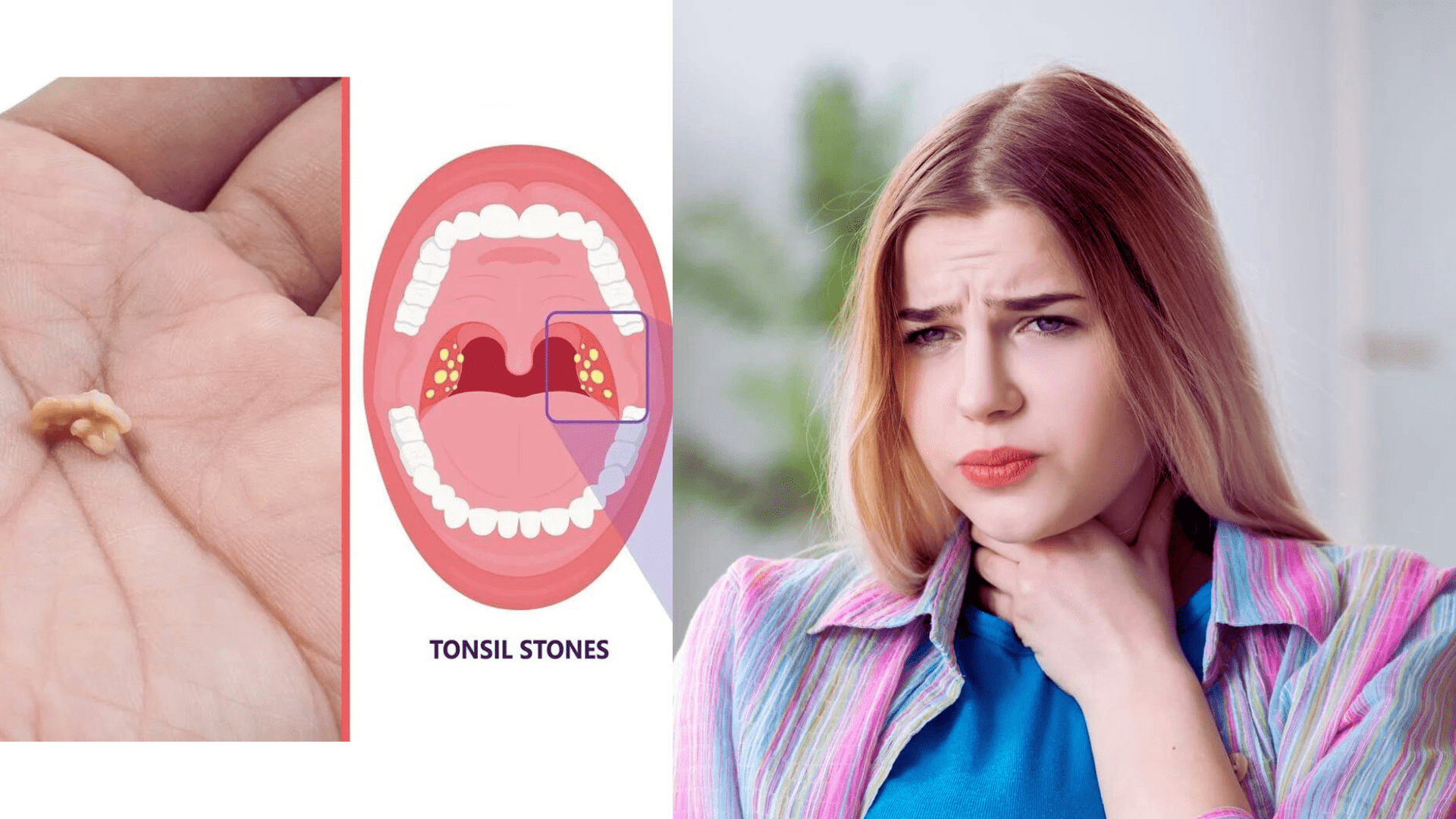Tonsil stones, or tonsilloliths, are small lumps of calcified material that form in the tonsils, typically at the back of the throat. These formations consist mainly of calcium but can contain other minerals and debris, such as food particles, mucus, and bacteria. They are usually white or yellowish and can cause symptoms such as bad breath, sore throat, difficulty swallowing, and a feeling of something being stuck in the throat.
Despite being relatively harmless, tonsil stones can be a nuisance and sometimes lead to discomfort or embarrassment due to their symptoms, primarily the bad breath they often cause. They are relatively common, particularly among people who have chronic tonsil inflammation or frequent tonsillitis. While they do not usually require serious medical treatment, larger stones can sometimes cause significant discomfort or health issues, necessitating removal either through simple at-home methods or, in more severe cases, surgical intervention.
Understanding Tonsils
Anatomy of Tonsils
The tonsils are lymphoid tissues located at the gateway of the respiratory and digestive tracts, primarily involved in the immune response to incoming pathogens. There are several groups of tonsils, which are part of a ring of glandular tissue encircling the back of the throat known as Waldeyer’s ring. The most commonly known are the palatine tonsils, situated between the palatoglossal and palatopharyngeal arches, visible at the back of the throat. The lingual tonsils are at the base of the tongue, and the pharyngeal tonsil, often referred to as the adenoid, is located at the back of the nasal cavity.
The structure of tonsils includes multiple folds and crypts that help trap pathogens. These structures are covered in epithelial cells and are rich in lymphocytes, which are cells of the immune system. When functioning normally, tonsils can help detect and fight infections, but their location and structure also make them susceptible to infections and inflammations themselves, such as tonsillitis.
Function of Tonsils
The tonsils are critical components of the immune system, primarily serving as the body’s first line of defense against airborne and ingested pathogens. Located at the entrance of the respiratory and digestive tracts, the tonsils filter and trap bacteria and viruses that enter through the mouth and nose. This action helps to prevent infections by stopping these pathogens before they can infiltrate deeper into the body.
Moreover, the tonsils contain immune cells that produce antibodies. These antibodies are specific proteins that neutralize pathogens, further enhancing the body’s ability to fight infections. By encountering and responding to pathogens, the tonsils also play a role in educating the immune system, helping it to better recognize and respond to similar threats in the future.
What are Tonsil Stones?

Tonsil stones, also known as tonsilloliths, are small, pebble-like calcifications that form within the tonsillar tissues in the throat. They are typically made up of calcium, along with other minerals like ammonia, phosphorus, and magnesium. Tonsil stones develop from accumulated debris, including bacteria, epithelial cells (lining of the mouth and throat), and food particles that get trapped in the crevices of the tonsils. Over time, this debris can harden or calcify into what we see as tonsil stones. They can vary in size and may cause symptoms such as a sore throat, bad breath, or discomfort when swallowing.
Composition
Tonsil stones, or tonsilloliths, are composed of several materials that accumulate in the crevices of the tonsils. The primary components of these stones include:
- Calcium: The most significant part of tonsil stones is calcium, which binds the other materials together and hardens into a stone-like structure.
- Food Debris: Particles of food that get trapped in the tonsils can contribute to the formation of these stones.
- Bacteria: Bacteria that thrive in the mouth can accumulate in these stones, adding to their mass.
- Dead Cells: Shredded epithelium, or surface lining cells of the tonsils, also make up a part of tonsil stones.
- White Blood Cells: Part of the immune response, these cells can end up in tonsil stones.
These components collectively form the hard, and often smelly, deposits known as tonsil stones.
Common Symptoms
Common symptoms of tonsil stones include:
- Bad breath (halitosis): This is often one of the most noticeable signs due to the sulfur compounds contained in the debris that forms the stones.
- Sore throat: The irritation from the stones can cause pain or discomfort in the throat.
- Difficulty swallowing: The presence of stones might make it uncomfortable or painful to swallow.
- Earache: This occurs because the nerve pathways are shared between the throat and the ears.
- Cough: Persistent cough may be triggered as the body attempts to expel the stones.
- Feeling of something being stuck in the back of the throat: This sensation can be persistent and annoying.
Causes of Tonsil Stones
Poor Oral Hygiene

Poor oral hygiene significantly contributes to the formation of tonsil stones. When oral hygiene is neglected, bacteria, food particles, and dead cells can accumulate in the crevices of the tonsils. Over time, these elements can calcify, turning into hard deposits known as tonsil stones. Maintaining good oral hygiene, such as regular brushing and flossing, helps prevent this buildup and reduces the likelihood of tonsil stone formation. Additionally, drinking plenty of water can help flush out food particles and bacteria from the tonsils, further preventing the stones from forming.
Large Tonsillar Crypts
Large tonsillar crypts, which are concave structures or deep folds within the tonsils, play a significant role in the formation of tonsil stones. These crypts provide a space where debris such as dead cells, mucus, saliva, and food particles can accumulate. The trapped materials can then calcify or harden over time, forming tonsil stones. Individuals with larger or more numerous tonsillar crypts are often more prone to developing tonsil stones because these structures offer more space for debris to collect. Repeated episodes of tonsillitis can lead to scarring and further expansion of these crypts, increasing the likelihood of stone formation.
Diet and Lifestyle
Diet and lifestyle play a crucial role in the formation of tonsil stones. Good oral hygiene, including regular brushing and flossing, significantly reduces the risk of tonsil stones by minimizing the accumulation of food particles and bacteria in the mouth. Staying well-hydrated by drinking plenty of water helps prevent the buildup of materials in the tonsils that can form stones.
Dietary choices also influence tonsil health. Avoiding dairy products, which can increase mucus production, as well as sugary, caffeinated, and alcoholic beverages, helps reduce the conditions that foster stone formation. A nutritious diet boosts the immune system, supporting overall oral and tonsil health and helping to prevent issues like tonsillitis and tonsil stones.
Bacteria and Infection
Bacteria and infections play significant roles in the formation of tonsil stones. The tonsils are part of the immune system and are prone to accumulating food, debris, and bacteria, which can form biofilms. These biofilms are complex communities of bacteria that adhere to surfaces and are more resistant to the immune response and antibiotics. Chronic bacterial infections within the tonsils can lead to persistent inflammation and may contribute to the development of tonsil stones by fostering an environment where debris and bacteria can accumulate and solidify into stones. Additionally, sharing bacteria through close contact or poor dental hygiene can disrupt the oral microbiome balance, increasing the risk of tonsil stones.
Prevention and Management
Improved Oral Hygiene

Improving oral hygiene is essential for preventing the formation of tonsil stones. Here are some effective tips:
- Regular Brushing and Flossing: Brush your teeth at least twice a day and floss daily to remove food debris and dental plaque that can contribute to tonsil stone formation.
- Gargle with Salt Water: Gargling with salt water can help to cleanse the tonsils and prevent the buildup of material that can form stones.
- Stay Hydrated: Drinking plenty of water helps to keep the mouth moist and encourages natural saliva production, which helps cleanse bacteria and particles from the mouth and throat.
- Use Mouthwash: An antibacterial mouthwash can help reduce the bacteria that cause tonsil stones. It’s beneficial to use a mouthwash after eating or before bedtime.
- Avoid Dry Mouth: Staying hydrated and possibly using a humidifier at night can help prevent dry mouth, which is conducive to tonsil stone formation.
- Dietary Adjustments: Reduce intake of dairy products as they can increase mucus production, which in turn may contribute to the formation of tonsil stones.
Dietary Changes
To prevent the formation of tonsil stones, consider incorporating the following dietary changes:
- Stay Hydrated: Drinking plenty of water helps keep the mouth and throat moist, reducing the chances of debris accumulation in the tonsils.
- Reduce Dairy Intake: Dairy products can increase mucus production, which might contribute to the formation of tonsil stones. Consider limiting or moderating your dairy consumption.
- Avoid Sugary Foods and Drinks: Sugary substances can foster bacterial growth and may increase the likelihood of tonsil stone formation. Opt for less sugary alternatives.
- Limit Sticky Foods: Foods that can stick to your tonsils, such as soft breads or peanut butter, should be consumed in moderation to prevent debris build-up.
Implementing these dietary adjustments can help minimize the risk of developing tonsil stones.
Medical Treatments
Professional treatments for tonsil stones vary depending on the severity of the condition. Here are the common treatments:
- Surgery: For persistent or particularly large tonsil stones that cause significant symptoms, surgical removal might be recommended. This is typically considered when other treatments have failed.
- Gargling: Diluted apple cider vinegar can be used to gargle, which helps break down the stones due to its acidic nature. Additionally, warm salt-water gargles can help dislodge tonsil stones and relieve discomfort.
- Water Flossing: A water flosser can be particularly effective in dislodging tonsil stones from the crypts in the tonsils.
- Tonsil Stone Removal Tools: Specialized tools like a tonsil stone remover vacuum or syringes filled with warm water can be used to gently rinse and extract the stones.
It is essential to maintain good oral hygiene and consult with a healthcare provider to determine the most appropriate treatment strategy.
Conclusion
Understanding what causes tonsil stones and how to manage them can help you maintain not only your oral health but also your overall well-being. By staying vigilant with hygiene and making some adjustments to your lifestyle, you can keep those pesky stones at bay.
Read also: What is MCV in Blood Test?
FAQs
Q. Can everyone get tonsil stones?
Yes, anyone with tonsils can potentially develop tonsil stones, though some people are more prone than others due to anatomical differences.
Q. Are tonsil stones contagious?
No, tonsil stones are not contagious, but the bacteria within them can contribute to bad breath.
Q. Do tonsil stones need to be removed surgically?
Not always. Many smaller stones can be dislodged at home using non-invasive methods like gargling salt water. Larger stones may require medical intervention.
Q. Can children get tonsil stones?
Yes, children with tonsils can develop tonsil stones, especially if they have chronic tonsil issues.
Q. Is there a permanent cure for tonsil stones?
Removing the tonsils through a procedure known as tonsillectomy is a permanent solution, but it is typically recommended only for severe cases.




